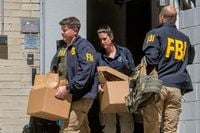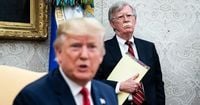On a humid August morning in the heart of Washington, D.C., the FBI quietly executed a court-authorized search at the downtown office of John Bolton, the former national security adviser to President Donald Trump. The date—August 22, 2025—would quickly become a flashpoint for renewed debate over the handling of classified information by America’s top officials, as agents uncovered a trove of records marked “confidential” and “secret,” with some files referencing weapons of mass destruction, U.S. diplomatic work at the United Nations, and the government’s own strategic communications efforts.
According to court filings reported by Newsweek and Politico, the FBI’s inventory of the seized documents included folders and collections that touched on some of the nation’s most sensitive security topics. While the precise number of documents remains unclear, the breadth of the material has reignited scrutiny of Bolton’s stewardship of classified information—a controversy that first emerged during the bitter legal fight over his 2020 memoir, The Room Where It Happened.
That same morning, FBI agents also searched Bolton’s home in Bethesda, Maryland. However, court records indicate that no overtly classified documents were recorded at the residence. Agents did, however, seize computers and electronic devices from both locations for forensic review, as confirmed by The Daily Beast. The warrant authorizing these actions was approved by U.S. Magistrate Judge Moxila Upadhyaya of the District of Columbia, reflecting the seriousness of the investigation’s legal underpinnings.
The FBI, in a brief statement, assured the public there was no threat to safety during the operation: “The FBI is conducting court-authorized activity in the area. There is no threat to public safety. We have no further comment.”
Behind the scenes, the legal stakes are high. Court records show that the FBI sought evidence of potential violations of Section 793 of Title 18—the Espionage Act, which criminalizes unauthorized retention or transmission of national defense information—as well as Section 1924, which prohibits unauthorized removal and retention of classified documents. The affidavit supporting the search warrant stated there was probable cause to believe Bolton “committed violations of federal criminal law” and that evidence of such offenses would be found at his office.
This fresh investigation carries echoes of past disputes. Back in 2020, as Bolton prepared to publish his explosive memoir, the National Security Council (NSC) warned that the manuscript contained “significant amounts of classified information, to include information classified at the TOP SECRET level,” per a January 2020 letter from Ellen Knight, the NSC’s Senior Director for Records, Access and Information Security Management. Although Knight later advised that revisions seemed to remove the classified content, Bolton proceeded with publication before receiving final written authorization. The Justice Department then sued to block the book’s release, arguing that Bolton had breached his nondisclosure agreements and jeopardized national security. U.S. District Judge Royce Lamberth denied the government’s request for an injunction but offered pointed criticism of Bolton’s actions, writing, “Bolton has gambled with the national security of the United States. He has exposed his country to harm and himself to civil (and potentially criminal) liability.” The litigation ended in June 2021, after the Justice Department, under new leadership, dropped the case and a related criminal inquiry.
The timing of the August 2025 searches is impossible to separate from the broader political context. Bolton, who served as national security adviser from 2018 to 2019, has since become a vocal critic of Trump, who has in turn labeled him “a real sort of a low life.” Speaking to reporters after the raid, Trump insisted he had no prior knowledge of it, adding that the search might reveal Bolton to be “a very unpatriotic guy.”
Vice President JD Vance, addressing the matter, confirmed that the administration was “in the very early stages of an ongoing investigation into John Bolton in relation to a classified documents probe.” He sought to tamp down speculation of political motivation, stating, “If they ultimately bring a case, it will be because they determine that he has broken the law… You shouldn’t throw people willy-nilly in prison. You should let the law drive these determinations, and that’s what we’re doing.”
Notably, the Bolton probe is the latest in a string of high-profile investigations into the mishandling of classified documents by senior officials. In 2023, Special Counsel Jack Smith charged Trump with multiple counts, including Espionage Act violations, for retaining classified documents at Mar-a-Lago. That case was dismissed in July 2024 by Judge Aileen Cannon, who ruled that Smith’s appointment was unconstitutional; Smith dropped his appeal after Trump’s 2024 election victory. Meanwhile, President Joe Biden faced his own scrutiny after classified documents surfaced at his Delaware home, but special counsel Robert Hur declined to press charges, citing insufficient likelihood of conviction.
Bolton’s defenders argue that the renewed investigation is a direct response to Trump’s calls for retribution against his political adversaries. Yet critics point to Bolton’s own history of stern public remarks about the importance of safeguarding classified information. In 2016, he told Fox Business Network, “If you’re conscious of the need to protect classified information you’ll remember what the rules are.” The following year, he added, “If I had done at the State Department what Hillary Clinton did, I’d be wearing an orange jumpsuit now.”
On the day of the searches, FBI Director Kash Patel took to social media to emphasize the principle of equal justice: “NO ONE is above the law… @FBI agents on mission.” Attorney General Pam Bondi echoed this sentiment, replying, “America’s safety isn’t negotiable. Justice will be pursued. Always.”
As for what comes next, the FBI and intelligence agencies will conduct a thorough forensic review of the seized files and devices to determine whether they contain classified material and to assess any potential national security risks. Depending on the findings, the Justice Department will decide whether to pursue criminal charges under statutes like the Espionage Act, initiate a civil action similar to the 2020 book dispute, or close the matter without further action. This process will unfold under the watchful eye of a public keenly aware of how similar cases involving Trump and Biden have played out.
For Bolton, the stakes are both legal and reputational. In the updated paperback edition of his memoir, released in January 2024, he predicted that Trump would use a second term to enact revenge on political foes, writing, “Trump really cares only about retribution for himself, and it will consume much of a second term.” Whether this latest legal drama will vindicate or vindictively target Bolton remains to be seen, but one thing is certain: the nation’s debate over classified information, accountability, and political score-settling is far from over.
With the forensic review underway and political tensions simmering, all eyes remain on the Justice Department’s next move—a decision that could ripple far beyond one man’s office and into the very heart of American governance.



